
Accessibility
The Judicial Branch seeks to ensure access to the courts and court services for all individuals, including those with functional diversity. To that end, the Judicial Branch provides reasonable accommodations. These accommodations are adjustments made in order to enable a person with a condition to understand and participate effectively in judicial proceedings and to benefit from programs or services available in the court.
Reasonable accommodations
A reasonable accommodation is an adjustment to the Judicial Branch’s policies, practices, and procedures to ensure proper access to justice. The type of reasonable accommodation will depend on the person’s needs, the proceedings being held, and the availability of different types of services and equipment.
What Types of Reasonable Accommodations Do the Courts Provide?
Some examples of reasonable accommodations include:
- In-court Sign Language Interpreters
- Virtual Remote Interpreting (VRI)
- Assistive Technology Equipment, such as personal sound amplification systems and remote sound amplifiers
How Do You Request Reasonable Accommodation?
Reasonable accommodation may be requested through motion or orally to the judge hearing the case. The judge presiding over the proceedings may also become aware of the need for such services. If deemed necessary, the court may issue an order requesting accommodation to the executive director of the judicial region corresponding to the case so the necessary arrangements can be made.
Reasonable accommodations may also be requested to a marshal, at the Office of the Clerk of the Court, or to any other court support staff who is assisting you.
Can a Person Enter a Courtroom with Their Service Animal?
Yes. Public Law No. 101-336 of 1990, as amended, known as the Americans with Disabilities Act (ADA), and Law No. 51 of May 29, 1970, as amended, known as the Service Animals for People with Disabilities Act, authorize those with functional diversity who require service animals to be accompanied by them in all areas of the courthouse that are accessible to the public, whether they be program participants or visitors.
What is a Service Animal?
A service animal is a dog that has been trained to perform tasks for the benefit of a person with functional diversity, including physical, mental, sensory, psychiatric, intellectual, or any other type of diversity.
Language Interpreter Services
What is a Language Interpreter?
A language interpreter is a person who interprets into a spoken language, either simultaneously or consecutively, the utterances of a speaker of another language. This facilitates communication between two or more people who speak different languages.
When Can This Service be Requested?
Language interpreters may be requested and used in any court proceeding or administrative matter when deemed necessary and authorized by a judge or the executive director. They may be requested and used in the following court proceedings:
Criminal cases by:
- the defendant, regardless of their financial status or the stage of the proceedings
- witnesses for the defense when the defendant is indigent, in accordance with the criteria established by the Rules for the Appointment of Counsel in Puerto Rico
Cases involving minors by:
- a minor who has been charged under Law No. 88 of July 9, 1986, as amended, known as the Puerto Rico Minors’ Act
- the parties to a case under Law No. 246 of 2011, as amended, known as the Child Safety, Well-being, and Protection Act, whether for the child concerned or for the respondent (the person against whom a protection order has been filed )
Civil cases by:
- the parties to a case involving a protection order for domestic violence, sexual violence, stalking, child abuse or neglect, and child protection services, among others
- the parties to cases that involve basic human needs, as provided in the Rules for the Appointment of Counsel in Puerto Rico and related regulations approved by the Office of Court Administration, such as matters regarding housing, child support, health, safety, and the rights of parents over their minor children, among others
What is the Difference Between an Interpreter and a Facilitator?
The main difference is in the scope of assistance they can provide. A facilitator is a Judicial Branch employee who has training or is proficient in another language and can provide general guidance on administrative matters to those who are not fluent in Spanish. However, they may not serve or be sworn in as an interpreter in a judicial proceeding.
Who Can Serve as a Language Interpreter?
The Judicial Branch has a Registry of Language Interpreters who can provide language interpreting services.
In exceptional cases, an individual present at the hearing may be sworn in by the judge as a language interpreter under the following conditions:
- when the case is being heard in an emergency situation or a walk-in case
- when the individual demonstrates proficiency in the two languages required to serve as an interpreter
- when the individual has no interest in the case
- when none of the persons listed in the Registry of Language Interpreters is available
Similarly, if a person requests their own interpreter and that person is available, the judge may authorize this if the circumstances of the case warrant it. If authorized, any party wishing to use their own interpreter will assume the corresponding costs.
How Can I Enroll with the Judicial Branch Registry of Language Interpreters?
Anyone who wishes to appear in the Registry of Language Interpreters must:
- be 21 years of age or older
- fill out the Application for Enrollment in the Judicial Branch Registry of Language Interpreters (OAT 1393)
- submit the corresponding documents:
- Certificate of completion of formal interpreting courses at accredited universities or specialized institutions
- Certificate that demonstrates passing the Federal Court Interpreter Certification Examination
- Reliable proof or certification showing that the individual works as an interpreter even though they have no formal education in the field
- Reliable proof or a sworn statement showing that the person’s command of Spanish or other languages enables them to serve as an interpreter, even though they have no formal training in the field of interpretation and do not work providing such services
The filing of an application to appear in the Registry of Language Interpreters may not necessarily mean that the person will be included in said Registry. Likewise, an individual’s inclusion in the Registry does not imply the judge will automatically acceptance their services in a court proceeding.
Sign Language Interpreter Services
Law No. 174 of 2018, also known as the Law to Provide Access to Justice for Individuals with Conditions that Prevent Them from Communicating Effectively, is intended to provide for the delivery of interpreting and recording services during court proceedings for persons who are deaf or who have a condition that prevents them from communicating effectively. To this end, the aforementioned law requires that an interpreter be provided in a civil or a criminal judicial proceeding when a person has profound, severe, moderate, or mild deafness or exhibits any other type of hearing loss or condition that prevents them from communicating effectively.
What is a Sign Language Interpreter and When Can This Service be Requested?
These interpreters provide sign language or lip-reading interpretation services, which they are trained to render in an effectively, accurately, and impartially, both as receivers and as senders of the message. They may use any specialized vocabulary that may be necessary for this purpose.
Sign language and lip-reading interpreters may be requested and used by:
- the parties at all stages of a court proceeding conducted in the divisions of the court hearing municipal, criminal, civil, or family and minors’ affairs
- individuals who have been subpoenaed to testify in a court proceeding
Sign language interpreters or facilitators may also be requested to assist those seeking services provided by the Judicial Branch, such as the Conflict Mediation Centers and the Pro Se Centers, among others.
What is the Difference Between a Sign Language Interpreter and a Sign Language Facilitator?
The main difference is in the scope of assistance they can provide. A facilitator is an employee of the Judicial Branch who has training or proficiency in sign language or lip reading and who can provide general guidance on administrative matters to persons who are deaf or have a condition that prevents them from communicating effectively. However, they may not serve or be sworn in as interpreters for judicial proceedings.
Who Can Serve as a Sign Language Interpreter?
Sign language and lip-reading interpreting services are provided by a company contracted by the Judicial Branch. However, if a person requests their own interpreter and that person is available, the judge may authorize it if the circumstances of the case warrant it. If authorized, any party wishing to use their own interpreter will assume the corresponding costs.
When is Equipment Used for the Recording and Preservation of Visual Records?
Once the reasonable accommodation has been authorized, the court, at its discretion and upon request, will adopt the necessary measures so that the hearings and other court proceedings may be recorded. These recordings will preserve a visual record of the proceedings to ensure its integrity where the court has authorized reasonable accommodations. These recordings will be part of the court record.
Assistive Technology Equipment
The Judicial Branch has various initiatives designed to improve the access to justice to vulnerable popultions, including individuals with mild or moderate deafness. To assist these individuals, the Judicial Branch has assistive technology devices available.
What Assistive Technology Does the Judicial Branch Offer?
Assistive technology devices are items, products, or systems that can be used to increase, maintain, or improve the functional capabilities of a person with functional diversity. The most frequently used devices in the Judicial Branch to effectively communicate with people who have difficulty speaking or hearing or who have vision impairments include:
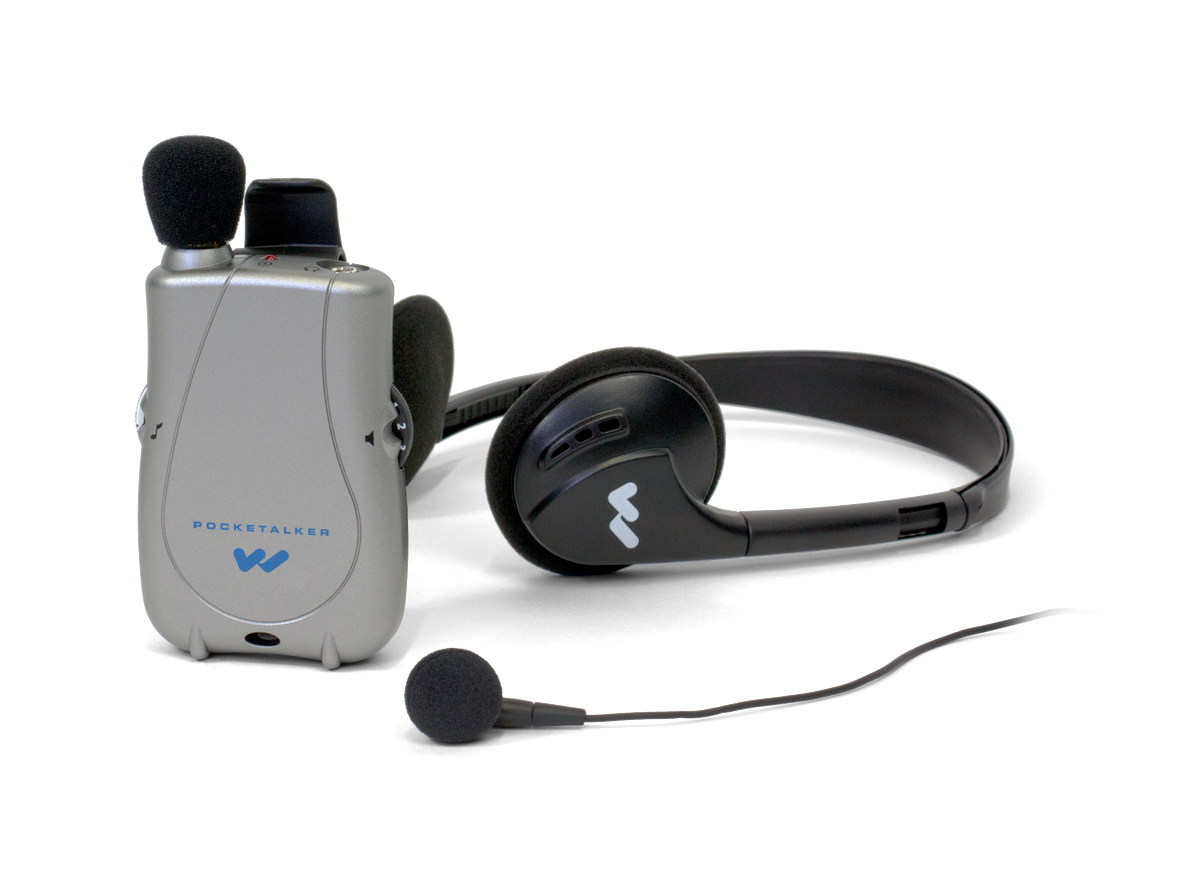
Personal Amplifier (Pocketalker):
This device amplifies nearby sounds. This device is practical, functional, and easy to use for face-to-face conversations and to pick up nearby speech or sounds. However, if the source of the sound is not close, a frequency-modulated (FM) amplifier may be more effective.
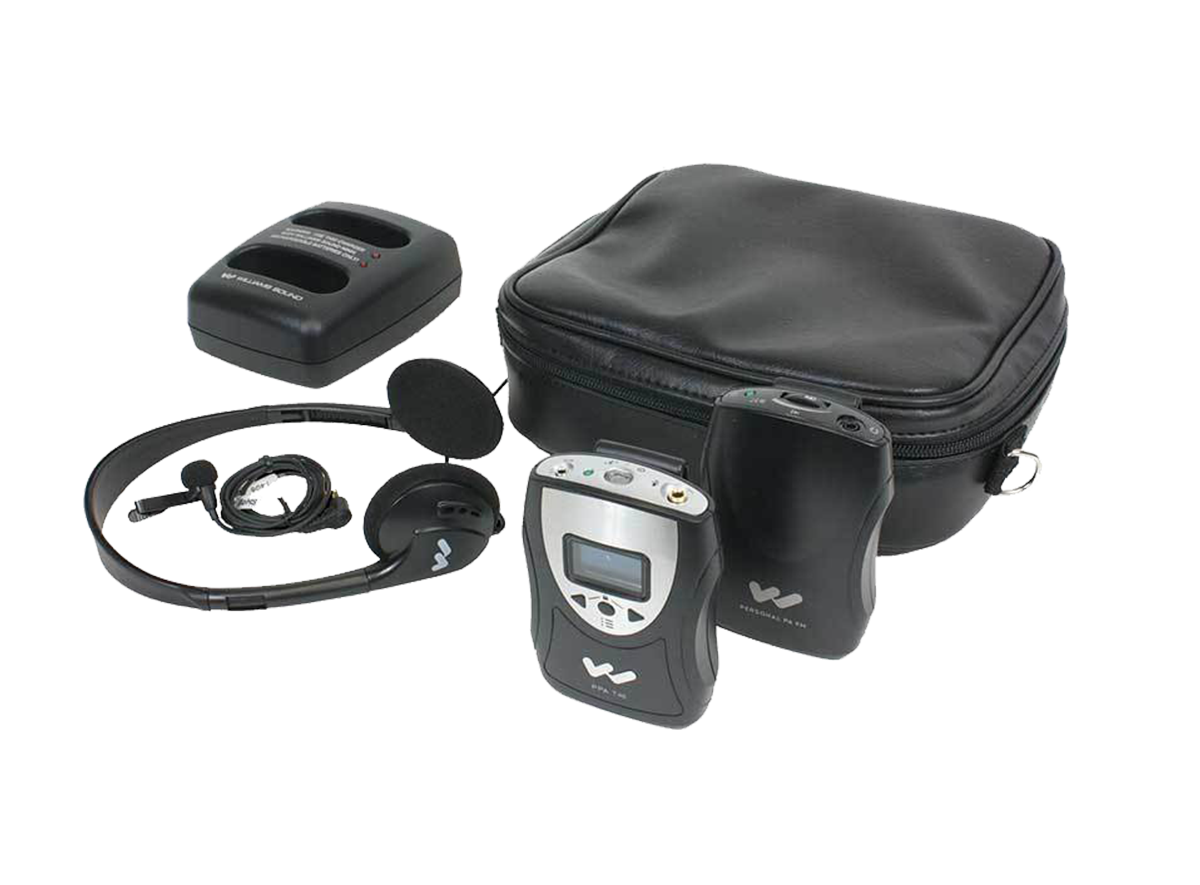
FM Sound Amplifier
This device amplifies sound from a distance. FM systems are suitable for large spaces or courtrooms, as they help capture and relay distant sounds directly to individuals who have hearing loss without any environmental distortion.
An FM sound amplifier has two components: a transmitter, which is attached to a microphone, and a receiver attached to a headset. The transmitter can capture sound in two ways: through a microphone placed on the speaker’s collar or through an auxiliary port when used with the connecting cables to other sound sources, such as the For The Record system. The FM audio amplifier receiver is placed on the person with hearing loss.
It is important to verify that both the transmitter and the receiver are on the same channel. If there is no sound when the device is turned on or if the sound is distorted, you can twist the couplings to boost the connection, as they are sometimes affected by humidity, especially if the device has been offline for a long period of time. If there is sound but it is distorted or there is interference, ask the technician to change the transmission channel to another channel with better signal.
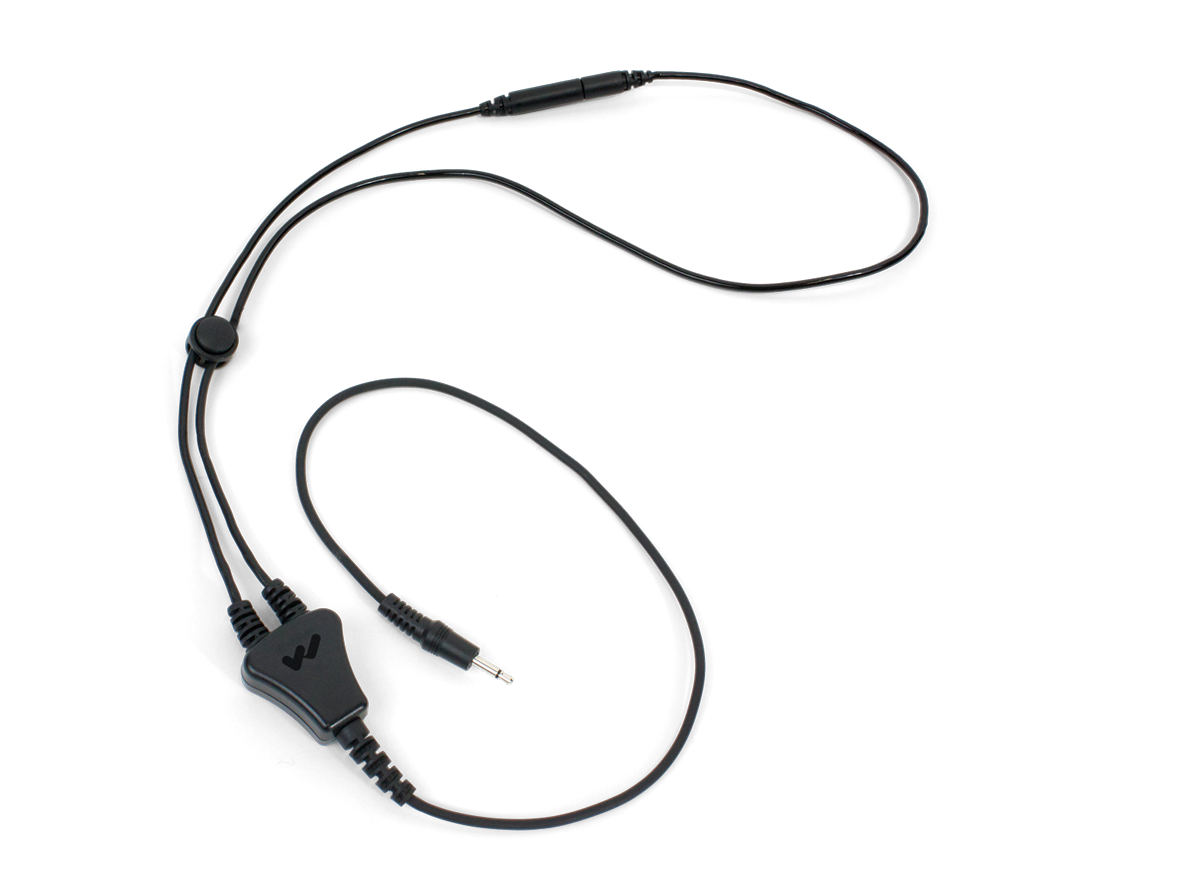
Induction Neckloop
Typical headphones are usually used with this device, but a neckloop may be worn around the neck of a person who has T-coil compatible hearing aids. This is a type of electromagnetic transmission available in some headphones.
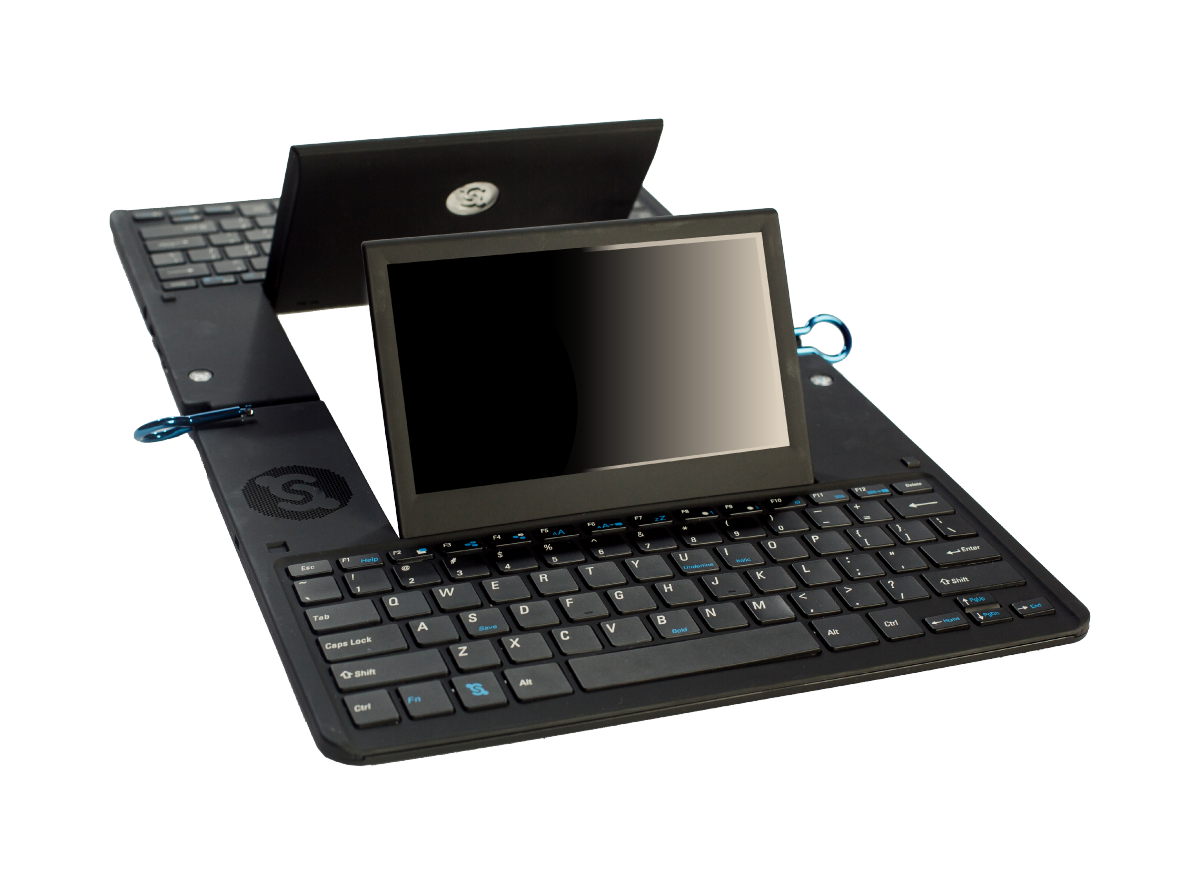
Ubi Duo Device
This device allows individuals with communication challenges to communicate with anyone through written text. In particular, this device facilitates more effective communication with or between persons who are deaf and are able to read and write.
Ubi Duo has easy-to-use functions that make face-to-face communication quick and easy.
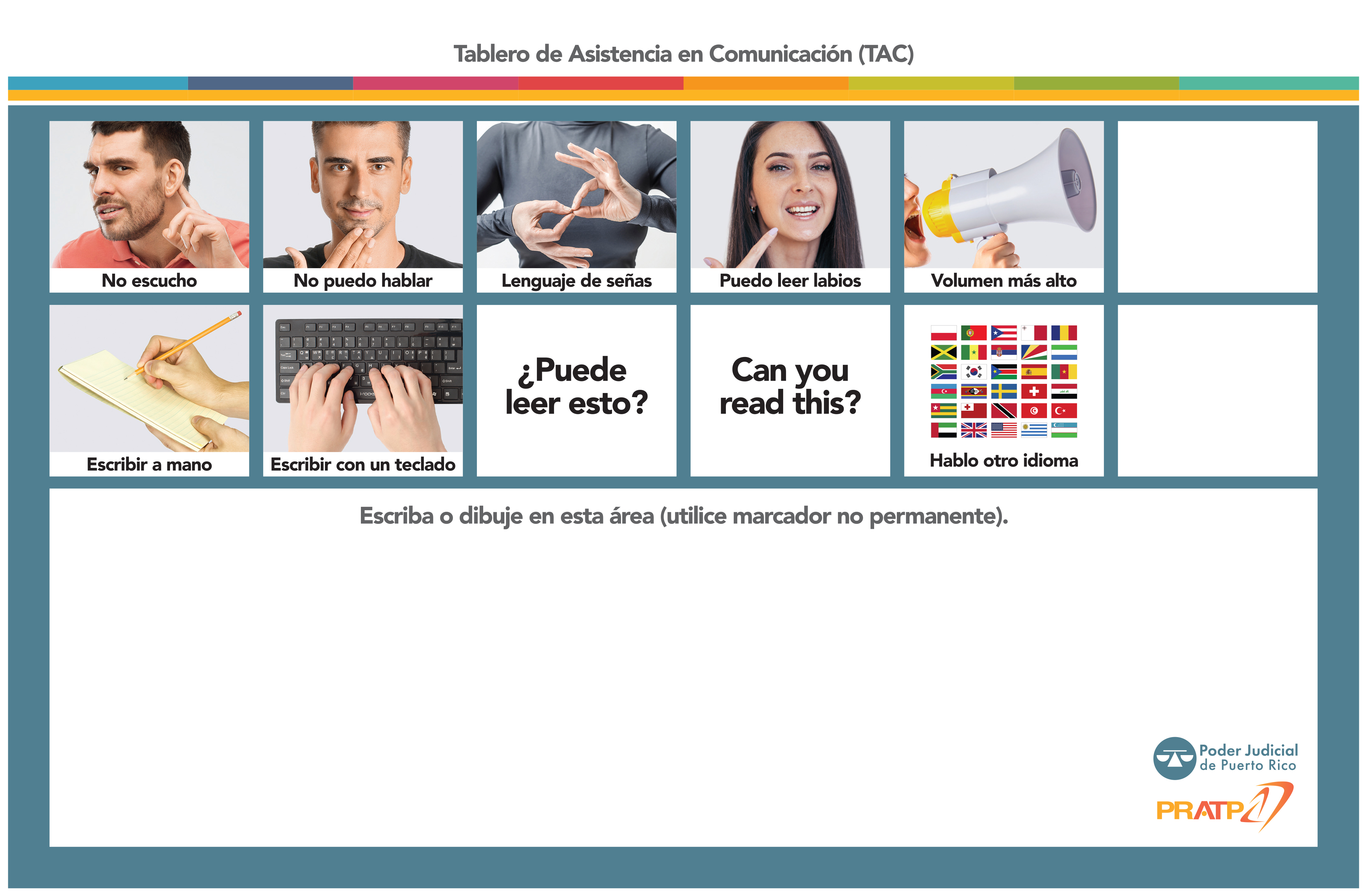
Communication Assistance Board
The Communication Assistance Board was developed by the Judicial Branch of Puerto Rico and the Puerto Rico Assistive Technology Program (PRATP) to help staff quickly identify the operative communication tool that a person with difficulty communicating may require.
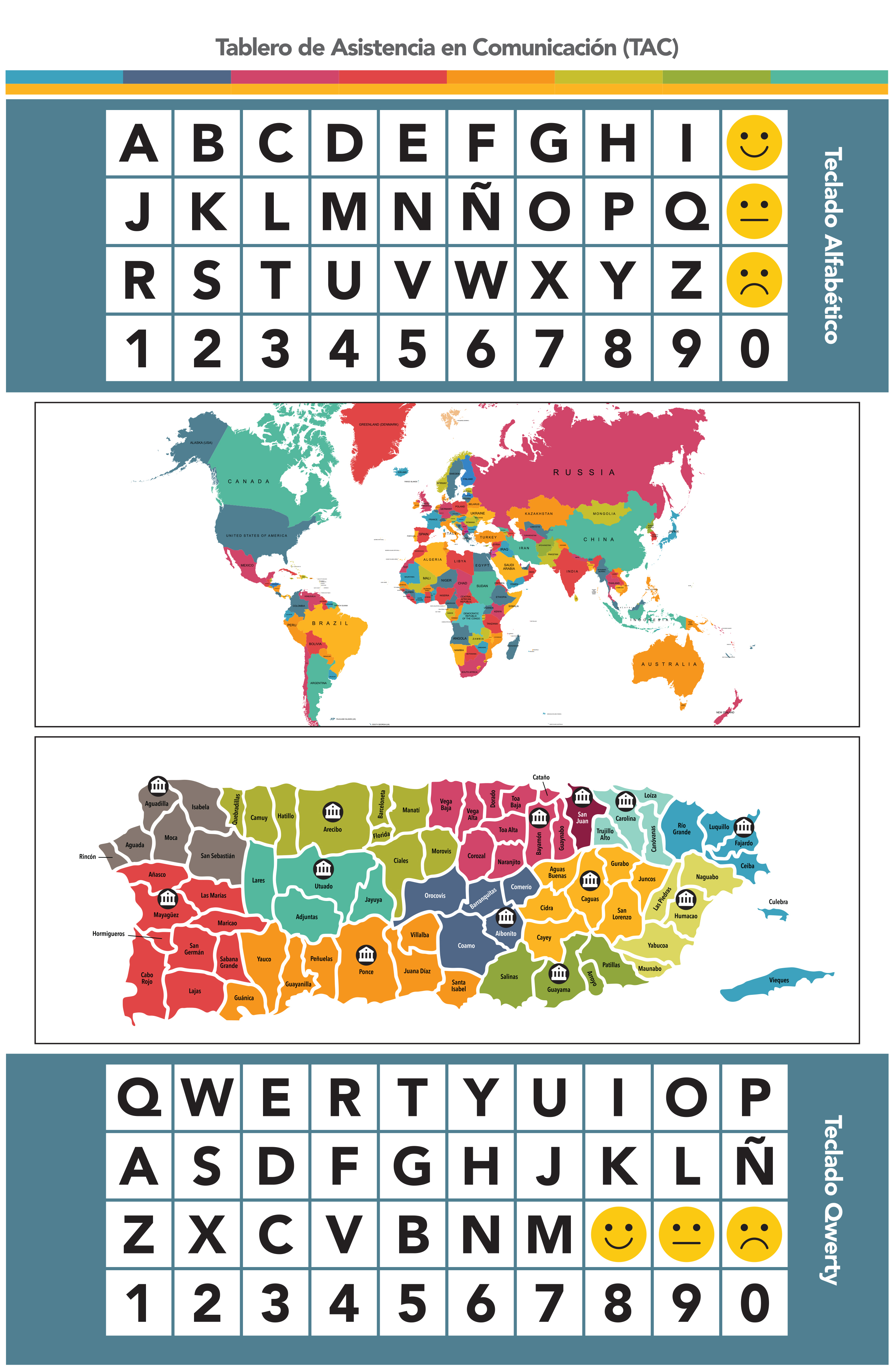
When Should Sound Amplifiers be Used?
Individuals with hearing loss experience difficulty understanding speech, particularly when the speaker is far away, when the space has poor acoustics, or if the environment is very noisy. In these situations, assistive technology devices, such as sound amplifiers, can be used to boost the volume of voices and improve the quality of sounds the individual wants to hear. Anyone with hearing loss can benefit from these or similar devices.
Every judicial region has two types of sound amplifiers available: personal sound amplifiers and frequency modulation (FM) sound amplifiers.
Why Should Sound Amplifiers be Used?
These devices help individuals with hearing loss who experience difficulty understanding speech, particularly when the speaker is far away, when the space has poor acoustics, or when the environment is very noisy. In these situations, sound amplifier systems can be used to boost the volume of voices and improve the quality of sound the individual wants to hear.
For More Information
To learn more or send feedback on how these services are provided to individuals with functional diversity, you may contact the Judicial Branch Accessibility Program at (787) 641-6600, ext. 5706. You may also email the Program Coordinator, Liani Cabán Reyes, at liani.caban@poderjudicial.pr.
For general information on Judicial Branch operations, as well as guidance regarding the Court System and how it works, you may contact the Judicial Branch Information Line by calling (787) 641-6263 or via email at buzon@poderjudicial.pr.

